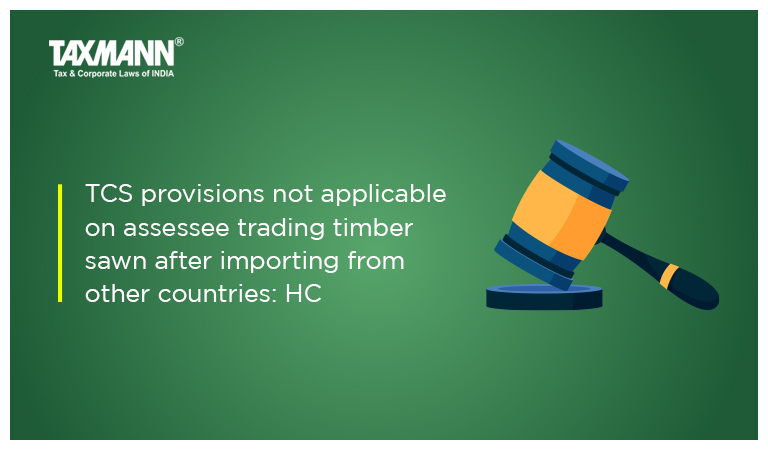TCS provisions not applicable on assessee trading timber sawn after importing from other countries: HC
- Blog|News|Income Tax|
- 3 Min Read
- By Taxmann
- |
- Last Updated on 21 September, 2022

Case Details: PCIT (TDS) v. Nirmal Kumar Kejriwal - [2022] 142 taxmann.com 141 (Calcutta)
Judiciary and Counsel Details
-
- T. S. Sivagnanam & Bivas Pattanayak
- Soumen Bhattacharyya, Adv. for the Appellant.
- J.P. Khaitan, Sr. Adv. & Ananda Sen, Adv. for the Respondent.
Facts of the Case
Assessee was engaged in trading of processed timber which was imported from several countries like Indonesia, Malaysia, and Burma. ‘Processed timber’ (sawn timber) was derived from timber logs that were cut in different sizes. The Assessing Officer (AO) held the assessee to be ‘assessee in default’ for non-collection of tax on the sale of timber as per provisions of section 206C(1).
On appeal, the CIT(A) set-aside order passed by AO. The Tribunal also upheld the findings of AO. Aggrieved-AO filed the instant appeal before the High Court.
High Court Held
The Calcutta High Court held that section 206C deals with profits and gains from the business of trading in alcoholic liquor, forest produce, scrap, etc. The table under section 206(1) leased out several products and serial No. (ii) deals with timber obtained under a forest lease. Thus, what has to be borne in mind is that the tax is collectible on forest produce.
Accordingly, to attract the provisions of section 206C, one has to examine whether the items sold by the assessee were forest produce or not. Forest produce is the produce grown spontaneously, maybe at the subsequent stages, some human effort and skill may be applied to protect and extract the resultant produce which could be considered as forest produce.
As was evident from the relevant provisions, the tax collection at the time of sale was intended only to be applied in respect of forest produce and not with reference to agricultural produce.
Further, if the timber is being sized, and sawn into logs of different dimensions and shapes in activities carried on sawmills authorized by the Government, it would amount to different produce. Even in respect of timbers that are procured as described in the table, if it is used in the process of manufacturing, the provision of section 206C(1) would not be applicable due to the fact that the product ceased to be a forest produce.
Therefore, considering the fact of the case, the provisions of section 206(1) would have no application.
List of Cases Reviewed
-
- Andhra Pradesh Forest Development Corpn. Ltd. v. Asstt. CIT [2005] 144 Taxman 51/272 ITR 245 (AP.) (para 9)
- Andaman & Nicobar Islands Forest & Plantation Development Corpn. Ltd. v. CIT [2005] 147 taxman 160/[2006] 280 ITR 118 (Cal.) (para 10) followed.
- Y. Moideen Kunhi v. Collector of Central Excise 1985 taxmann.com 10 (Kar.) (para 11) distinguished.
- order of ITAT, Calcutta in ITA Nos. 249 to 253/Kol./2013, CO No. 39/Kol./2013, dated 6-4-2016 and corrigendum dated 12-5-2016 (para 12) affirmed.
List of Cases Referred to
-
- Y. Moideen Kunhi v. Collector of Central Excise 1985 taxmann.com 10 (Kar.) (para 7)
- Collector of Central Excise v. Y. Moideen Kunhi & Co. 2004 (163) ELT 299 (Kar.) (para 7)
- State of Orissa v. Titaghur Paper Mills Co. Ltd. AIR 1985 SC 1293 (para 7)
- Andhra Pradesh Forest Development Corpn. Ltd. v. Asstt. CIT [2005] 144 Taxman 51/272 ITR 245 (AP) (para 9)
- Andaman & Nicobar Islands Forest & Plantation Development Corpn. Ltd. v. CIT [2005] 147 Taxman 160/[2006] 280 ITR 118 (Cal.) (para 10).
Disclaimer: The content/information published on the website is only for general information of the user and shall not be construed as legal advice. While the Taxmann has exercised reasonable efforts to ensure the veracity of information/content published, Taxmann shall be under no liability in any manner whatsoever for incorrect information, if any.

Taxmann Publications has a dedicated in-house Research & Editorial Team. This team consists of a team of Chartered Accountants, Company Secretaries, and Lawyers. This team works under the guidance and supervision of editor-in-chief Mr Rakesh Bhargava.
The Research and Editorial Team is responsible for developing reliable and accurate content for the readers. The team follows the six-sigma approach to achieve the benchmark of zero error in its publications and research platforms. The team ensures that the following publication guidelines are thoroughly followed while developing the content:
- The statutory material is obtained only from the authorized and reliable sources
- All the latest developments in the judicial and legislative fields are covered
- Prepare the analytical write-ups on current, controversial, and important issues to help the readers to understand the concept and its implications
- Every content published by Taxmann is complete, accurate and lucid
- All evidence-based statements are supported with proper reference to Section, Circular No., Notification No. or citations
- The golden rules of grammar, style and consistency are thoroughly followed
- Font and size that’s easy to read and remain consistent across all imprint and digital publications are applied



 CA | CS | CMA
CA | CS | CMA
